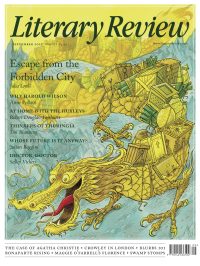John Adamson
His Majesty the First Consul
Napoleon at Peace: How to End a Revolution
By William Doyle
Reaktion 231pp £15.99
The French Revolution abounds in ironies. But there are few to match the bloodless coup d’état of November 1799 that brought an end to the Revolution’s decade-long series of experiments with ‘popular government’ and placed supreme power once again in the hands of a single ruler. In best revolutionary tradition, the new constitution’s nomenclature was cribbed from the Roman Republic: there were to be a Senate, Tribunes and a ruling triumvirate of Consuls. But real power was monarchical, residing exclusively with the First Consul, Napoleon Bonaparte, at just thirty the most successful of the generals thrown up by France’s revolutionary wars.
Bonaparte’s period as First Consul was arguably the most formative episode in his giddily eventful career. The five years from 1799 witnessed the consolidation of his personal power and the gradual replacement of the neo-Roman ‘magistracy’ with the full panoply of hereditary imperial rule. The Revolution was comprehensively subverted and the new ‘Emperor Napoleon’ (as he became in 1804) emerged as the most powerful monarch in Europe.
Many are the historians who have attempted to explain this metamorphosis, and it is a mark of how good a one is William Doyle, professor emeritus at Bristol and one of the leading scholars of ancien régime France, that his slim new book has interesting and important things to say.
Central to Bonaparte’s success, Doyle contends, was his skill in identifying, and eventually healing, what he terms the three great ‘wounds’ inflicted on France by the Revolution: its breach with the monarchies of Europe, its failure to provide government that worked and its self-destructive hostility to the Catholic Church

Sign Up to our newsletter
Receive free articles, highlights from the archive, news, details of prizes, and much more.@Lit_Review
Follow Literary Review on Twitter
Twitter Feed
'A charming and amusing personal history'
Don't miss this brilliant @Lit_Review review of #WorldCupFever 👇
@KuperSimon's must-read footballing journey in nine tournaments is out now ⚽️🏆
Michael Taylor - The Beautiful Game
Michael Taylor: The Beautiful Game - World Cup Fever: A Footballing Journey in Nine Tournaments by Simon Kuper; Th...
literaryreview.co.uk
In the summer of 1918, the Caspian port of Baku played host to a remarkable group of Allied soldiers, sent to defend oil wells against the Ottomans.
Anna Reid recounts their escapades.
Anna Reid - Mission Impossible
Anna Reid: Mission Impossible - Mavericks: Empire, Oil, Revolution and the Forgotten Battle of World War One by Nick Higham
literaryreview.co.uk
Alfred, Lord Tennyson is practically a byword for old-fashioned Victorian grandeur, rarely pictured without a cravat and a serious beard.
Seamus Perry tries to picture him as a younger man.
Seamus Perry - Before the Beard
Seamus Perry: Before the Beard - The Boundless Deep: Young Tennyson, Science, and the Crisis of Belief by Richard Holmes
literaryreview.co.uk